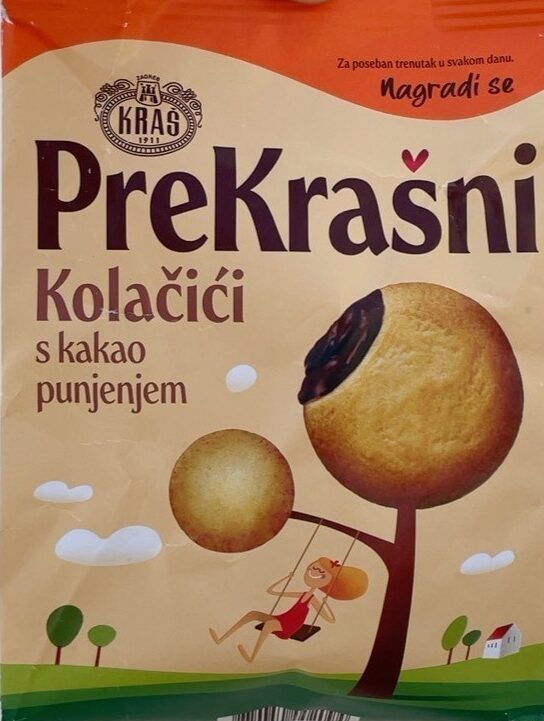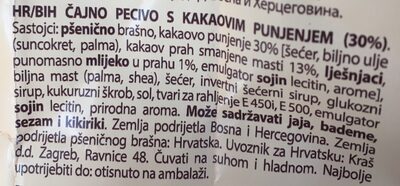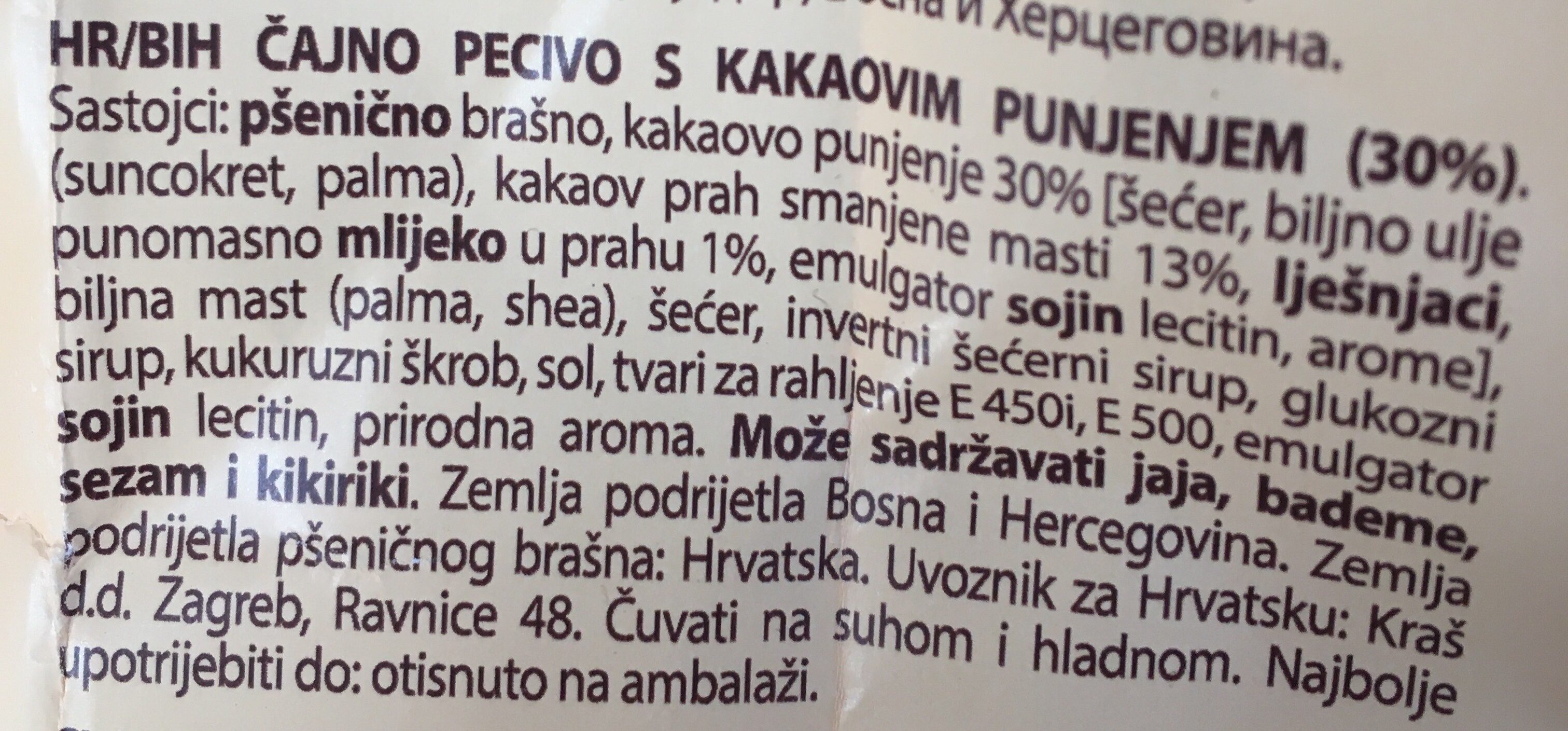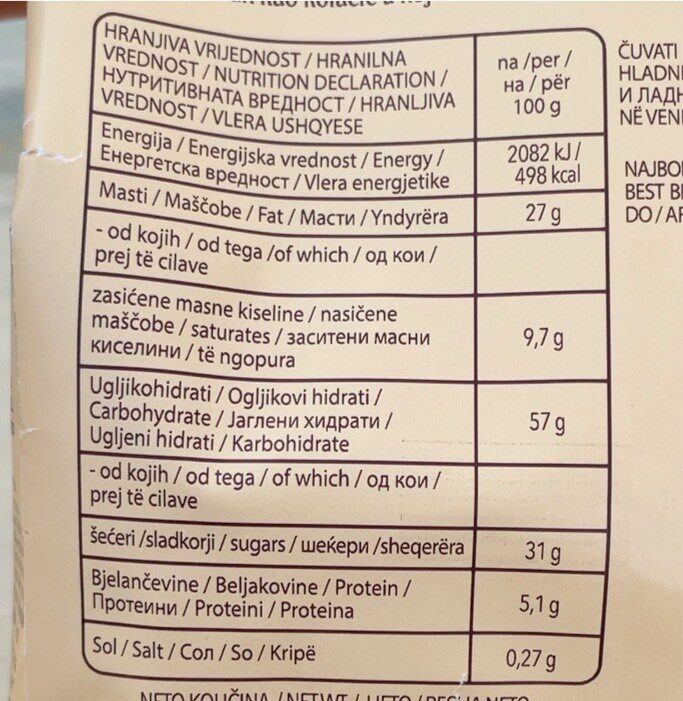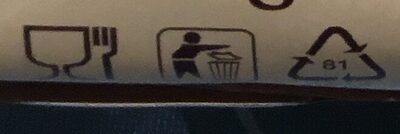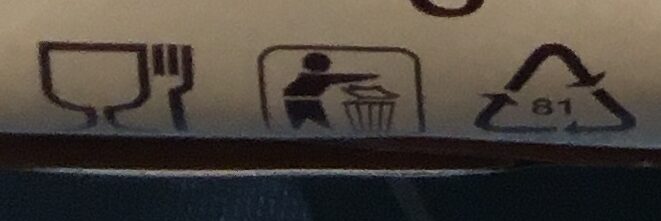Help us make food transparency the norm!
As a non-profit organization, we depend on your donations to continue informing consumers around the world about what they eat.
The food revolution starts with you!
prekrašni kolačići s kakao punjenjem - Kraš - 220g
prekrašni kolačići s kakao punjenjem - Kraš - 220g
Barkod: 3870450002094 (EAN / EAN-13)
Common name: Cookies with cocoa filling
Količina: 220g
Ambalaža: en:Plastic
Brendovi: Kraš
Kategorije: en:Snacks, en:Sweet snacks, en:Biscuits and cakes, en:Biscuits, en:Chocolate biscuits
Labels, certifications, awards: en:Non-vegan, en:With Sunflower oil
Origin of the product and/or its ingredients: Bosna i Hercegovina, Hrvatska
Origin of ingredients: Bosna i Hercegovina, Hrvatska
Manufacturing or processing places: Croatia
Link to the product page on the official site of the producer: https://www.kras.hr/hr/proizvodi/keksi-v...
Stores: Konzum, Plodine, Studenac
Zemlje gdje se prodaju: Albanija, Bosna i Hercegovina, Hrvatska, Crna Gora, Sjeverna Makedonija, Srbija, Slovenija
Matching with your preferences
Zdravlje
Sastojci
-
24 ingredients
Hrvatski jezik: Pšenično brašno, kakaovo punjenje 30% [šećer, biljno ulje (suncokret, palma), kakaov prah smanjene masti 13%, lješnjaci, punomasno mlijeko u prahu 1%, emulgator sojin lecitin, arome], biljna mast (palma, shea), šećer, invertni šećerni sirup, glukozni sirup, kukuruzni škrob, sol, tvari za rahljenje E 450i, E 500, emulgator sojin lecitin, prirodna aroma. Može sadržavati jaja, bademe, sezam i kikiriki.Allergens: Jaja, Gluten, en:Milk, Bademe, en:Peanuts, en:Sesame seeds, en:SoybeansTraces: Jaja, Bademe, en:Peanuts, en:Sesame seeds
Food processing
-
Ultra processed foods
Elements that indicate the product is in the en:4 - Ultra processed food and drink products group:
- Additive: E450
- Ingredient: Aroma
- Ingredient: Glukoza
- Ingredient: Glukozni sirup
- Ingredient: Invert sugar
Food products are classified into 4 groups according to their degree of processing:
- Unprocessed or minimally processed foods
- Processed culinary ingredients
- Processed foods
- Ultra processed foods
The determination of the group is based on the category of the product and on the ingredients it contains.
Additives
-
E500
Sodium carbonate: Sodium carbonate, Na2CO3, -also known as washing soda, soda ash and soda crystals, and in the monohydrate form as crystal carbonate- is the water-soluble sodium salt of carbonic acid. It most commonly occurs as a crystalline decahydrate, which readily effloresces to form a white powder, the monohydrate. Pure sodium carbonate is a white, odorless powder that is hygroscopic -absorbs moisture from the air-. It has a strongly alkaline taste, and forms a moderately basic solution in water. Sodium carbonate is well known domestically for its everyday use as a water softener. Historically it was extracted from the ashes of plants growing in sodium-rich soils, such as vegetation from the Middle East, kelp from Scotland and seaweed from Spain. Because the ashes of these sodium-rich plants were noticeably different from ashes of timber -used to create potash-, they became known as "soda ash". It is synthetically produced in large quantities from salt -sodium chloride- and limestone by a method known as the Solvay process. The manufacture of glass is one of the most important uses of sodium carbonate. Sodium carbonate acts as a flux for silica, lowering the melting point of the mixture to something achievable without special materials. This "soda glass" is mildly water-soluble, so some calcium carbonate is added to the melt mixture to make the glass produced insoluble. This type of glass is known as soda lime glass: "soda" for the sodium carbonate and "lime" for the calcium carbonate. Soda lime glass has been the most common form of glass for centuries. Sodium carbonate is also used as a relatively strong base in various settings. For example, it is used as a pH regulator to maintain stable alkaline conditions necessary for the action of the majority of photographic film developing agents. It acts as an alkali because when dissolved in water, it dissociates into the weak acid: carbonic acid and the strong alkali: sodium hydroxide. This gives sodium carbonate in solution the ability to attack metals such as aluminium with the release of hydrogen gas.It is a common additive in swimming pools used to raise the pH which can be lowered by chlorine tablets and other additives which contain acids. In cooking, it is sometimes used in place of sodium hydroxide for lyeing, especially with German pretzels and lye rolls. These dishes are treated with a solution of an alkaline substance to change the pH of the surface of the food and improve browning. In taxidermy, sodium carbonate added to boiling water will remove flesh from the bones of animal carcasses for trophy mounting or educational display. In chemistry, it is often used as an electrolyte. Electrolytes are usually salt-based, and sodium carbonate acts as a very good conductor in the process of electrolysis. In addition, unlike chloride ions, which form chlorine gas, carbonate ions are not corrosive to the anodes. It is also used as a primary standard for acid-base titrations because it is solid and air-stable, making it easy to weigh accurately.Source: Wikipedia (Engleski jezik)
Ingredients analysis
-
en:Palm oil
Ingredients that contain palm oil: en:Palm, en:Palm
-
en:Non-vegan
Non-vegan ingredients: Punomasno mleko
-
en:Maybe vegetarian
Ingredients that may not be vegetarian: Aroma, en:Natural flavouring
-
Details of the analysis of the ingredients
hr: Pšenično brašno, kakaovo punjenje 30% (šećer, biljno ulje (suncokret, palma), kakaov prah smanjene masti 13%, lješnjaci, punomasno mlijeko 1%, emulgator sojin lecitin, arome), biljna mast (palma, shea), šećer, invertni šećerni sirup, glukozni sirup, kukuruzni škrob, sol, tvari za rahljenje (e450i), e500, emulgator sojin lecitin, prirodna aroma- Pšenično brašno -> en:wheat-flour - vegan: yes - vegetarian: yes - ciqual_proxy_food_code: 9410
- kakaovo punjenje -> en:cocoa-filling - vegan: maybe - vegetarian: maybe - percent: 30
- šećer -> en:sugar - vegan: yes - vegetarian: yes - ciqual_proxy_food_code: 31016
- biljno ulje -> en:vegetable-oil - vegan: yes - vegetarian: yes - from_palm_oil: maybe
- suncokret -> en:sunflower - vegan: yes - vegetarian: yes
- palma -> en:palm - vegan: yes - vegetarian: yes - from_palm_oil: yes - ciqual_food_code: 16129
- kakaov prah smanjene masti -> en:fat-reduced-cocoa-powder - vegan: yes - vegetarian: yes - ciqual_food_code: 18100 - percent: 13
- lješnjaci -> en:hazelnut - vegan: yes - vegetarian: yes - ciqual_food_code: 15004
- punomasno mlijeko -> en:whole-milk - vegan: no - vegetarian: yes - ciqual_food_code: 19023 - percent: 1
- emulgator sojin lecitin -> en:soya-lecithin - vegan: yes - vegetarian: yes - ciqual_food_code: 42200
- arome -> en:flavouring - vegan: maybe - vegetarian: maybe
- biljna mast -> en:vegetable-fat - vegan: yes - vegetarian: yes - from_palm_oil: maybe
- palma -> en:palm - vegan: yes - vegetarian: yes - from_palm_oil: yes - ciqual_food_code: 16129
- shea -> en:shea-butter - vegan: yes - vegetarian: yes - from_palm_oil: no
- šećer -> en:sugar - vegan: yes - vegetarian: yes - ciqual_proxy_food_code: 31016
- invertni šećerni sirup -> en:invert-sugar-syrup - vegan: yes - vegetarian: yes
- glukozni sirup -> en:glucose-syrup - vegan: yes - vegetarian: yes - ciqual_proxy_food_code: 31016
- kukuruzni škrob -> en:corn-starch - vegan: yes - vegetarian: yes - ciqual_food_code: 9510
- sol -> en:salt - vegan: yes - vegetarian: yes - ciqual_food_code: 11058
- tvari za rahljenje -> en:raising-agent
- e450i -> en:e450i - vegan: yes - vegetarian: yes
- e500 -> en:e500 - vegan: yes - vegetarian: yes
- emulgator sojin lecitin -> en:soya-lecithin - vegan: yes - vegetarian: yes - ciqual_food_code: 42200
- prirodna aroma -> en:natural-flavouring - vegan: maybe - vegetarian: maybe
Nutrition
-
Bad nutritional quality
⚠ ️Warning: the amount of fruits, vegetables and nuts is not specified on the label, it was estimated from the list of ingredients: 0This product is not considered a beverage for the calculation of the Nutri-Score.
Positive points: 0
- Proteins: 3 / 5 (vrijednost: 5.1, rounded value: 5.1)
- Fiber: 0 / 5 (vrijednost: 0, rounded value: 0)
- Fruits, vegetables, nuts, and colza/walnut/olive oils: 0 / 5 (vrijednost: 0, rounded value: 0)
Negative points: 22
- Energy: 6 / 10 (vrijednost: 2082, rounded value: 2082)
- Sugars: 6 / 10 (vrijednost: 31, rounded value: 31)
- Saturated fat: 9 / 10 (vrijednost: 9.7, rounded value: 9.7)
- Sodium: 1 / 10 (vrijednost: 108, rounded value: 108)
The points for proteins are not counted because the negative points are greater or equal to 11.
Nutritional score: (22 - 0)
Nutri-Score:
-
Nutrient levels
-
Fat in high quantity (27%)
What you need to know- A high consumption of fat, especially saturated fats, can raise cholesterol, which increases the risk of heart diseases.
Recommendation: Limit the consumption of fat and saturated fat- Choose products with lower fat and saturated fat content.
-
Saturated fat in high quantity (9.7%)
What you need to know- A high consumption of fat, especially saturated fats, can raise cholesterol, which increases the risk of heart diseases.
Recommendation: Limit the consumption of fat and saturated fat- Choose products with lower fat and saturated fat content.
-
Šećer in high quantity (31%)
What you need to know- A high consumption of sugar can cause weight gain and tooth decay. It also augments the risk of type 2 diabetes and cardio-vascular diseases.
Recommendation: Limit the consumption of sugar and sugary drinks- Sugary drinks (such as sodas, fruit beverages, and fruit juices and nectars) should be limited as much as possible (no more than 1 glass a day).
- Choose products with lower sugar content and reduce the consumption of products with added sugars.
-
So in low quantity (0.27%)
What you need to know- A high consumption of salt (or sodium) can cause raised blood pressure, which can increase the risk of heart disease and stroke.
- Many people who have high blood pressure do not know it, as there are often no symptoms.
- Most people consume too much salt (on average 9 to 12 grams per day), around twice the recommended maximum level of intake.
Recommendation: Limit the consumption of salt and salted food- Reduce the quantity of salt used when cooking, and don't salt again at the table.
- Limit the consumption of salty snacks and choose products with lower salt content.
-
-
Nutritivne činjenice
Nutritivne činjenice As sold
for 100 g / 100 mlCompared to: en:Biscuits Energija 2.082 kj
(498 kcal)+9% Fat 27 g +34% Saturated fat 9,7 g +7% Carbohydrates 57 g +2% Šećer 31 g +28% Fiber - Bjelančevine 5,1 g -32% So 0,27 g -69% Alkohol 0 % vol Fruits‚ vegetables‚ nuts and rapeseed‚ walnut and olive oils (estimate from ingredients list analysis) 0 %
Životna sredina
-
Eco-Score C - Moderate environmental impact
The Eco-Score is an experimental score that summarizes the environmental impacts of food products.→ The Eco-Score was initially developped for France and it is being extended to other European countries. The Eco-Score formula is subject to change as it is regularly improved to make it more precise and better suited to each country.Life cycle analysis
-
Average impact of products of the same category: C (Score: 56/100)
Kategorija: Biscuit (cookie), with chocolate, prepacked
Kategorija: Biscuit (cookie), with chocolate, prepacked
- PEF environmental score: 0.47 (the lower the score, the lower the impact)
- including impact on climate change: 5.92 kg CO2 eq/kg of product
Stage Impact Agriculture
63.6 %Processing
29.8 %Ambalaža
2.3 %Transportation
3.2 %Distribution
1.0 %Consumption
0.0 %
Bonuses and maluses
-
Origins of ingredients with a medium impact
Bonus: +11
Environmental policy: -3
Transportation: +14
Origin of the product and/or its ingredients % of ingredients Impact Bosna i Hercegovina 50 %Medium Hrvatska 50 %Medium
-
Ingredients that threatens species
Malus: -10
Contains palm oil
Tropical forests in Asia, Africa and Latin America are destroyed to create and expand oil palm tree plantations. The deforestation contributes to climate change, and it endangers species such as the orangutan, the pigmy elephant and the Sumatran rhino.
-
Packaging with a medium impact
Malus: -10
Shape Material Recycling Impact Unknown Plastic High ⚠ ️ The information about the packaging of this product is not sufficiently precise (exact shapes and materials of all components of the packaging).⚠ ️ For a more precise calculation of the Eco-Score, you can modify the product page and add them.
If you are the manufacturer of this product, you can send us the information with our free platform for producers.
Eco-Score for this product
-
Impact for this product: C (Score: 47/100)
Proizvod: prekrašni kolačići s kakao punjenjem - Kraš - 220g
Life cycle analysis score: 56
Sum of bonuses and maluses: -9
Final score: 47/100
-
Stopa utacaja ugljen-dioksida na životnu sredinu
-
Equal to driving 3.1 km in a petrol car
592 g CO² per 100g of product
The carbon emission figure comes from ADEME's Agribalyse database, for the category: Biscuit (cookie), with chocolate, prepacked (Source: ADEME Agribalyse Database)
Stage Impact Agriculture
52.9 %Processing
42.0 %Ambalaža
1.9 %Transportation
2.9 %Distribution
0.3 %Consumption
0.0 %
Ambalaža
-
Packaging with a medium impact
-
Packaging parts
(Plastic)
-
Packaging materials
Material % Packaging weight Packaging weight per 100 g of product Plastic
-
Transportation
-
Origins of ingredients
Origins of ingredients with a medium impact
Origin of the product and/or its ingredients % of ingredients Impact Bosna i Hercegovina 50 %Medium Hrvatska 50 %Medium
Ugrožene vrste
-
Contains palm oil
Drives deforestation and threatens species such as the orangutan
Tropical forests in Asia, Africa and Latin America are destroyed to create and expand oil palm tree plantations. The deforestation contributes to climate change, and it endangers species such as the orangutan, the pigmy elephant and the Sumatran rhino.
Report a problem
-
Incomplete or incorrect information?
Category, labels, ingredients, allergens, nutritional information, photos etc.
If the information does not match the information on the packaging, please complete or correct it. Open Food Facts is a collaborative database, and every contribution is useful for all.
Data sources
Product added on by openfoodfacts-contributors
Last edit of product page on by benbenben.
Product page also edited by caellian, charlesnepote, ecoscore-impact-estimator, inf, kiliweb, packbot, yuka.sY2b0xO6T85zoF3NwEKvlmtoDMfgji-bLUXumW2P-MrQLZbkee5o06j2b6s.

